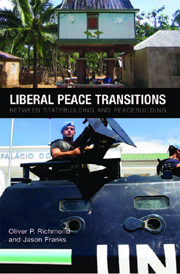Book contents
- Frontmatter
- Contents
- Acknowledgements
- List of Acronyms
- Introduction: a Framework to Assess Liberal Peace Transitions
- 1 Cambodia: Liberal Hubris and Virtual Peace
- 2 Bosnia: Between Partition and Pluralism
- 3 Liberal Peace in East Timor: the Emperors' New Clothes?
- 4 Co-opting the Liberal Peace: Untying the Gordian Knot in Kosovo
- 5 Building/Rejecting the Liberal Peace: State Consolidation and Liberal Failure in the Middle East
- Conclusion: Evaluating the Achievements of the Liberal Peace and Revitalising a Virtual Peace
- Select Bibliography
- Index
Conclusion: Evaluating the Achievements of the Liberal Peace and Revitalising a Virtual Peace
Published online by Cambridge University Press: 12 September 2012
- Frontmatter
- Contents
- Acknowledgements
- List of Acronyms
- Introduction: a Framework to Assess Liberal Peace Transitions
- 1 Cambodia: Liberal Hubris and Virtual Peace
- 2 Bosnia: Between Partition and Pluralism
- 3 Liberal Peace in East Timor: the Emperors' New Clothes?
- 4 Co-opting the Liberal Peace: Untying the Gordian Knot in Kosovo
- 5 Building/Rejecting the Liberal Peace: State Consolidation and Liberal Failure in the Middle East
- Conclusion: Evaluating the Achievements of the Liberal Peace and Revitalising a Virtual Peace
- Select Bibliography
- Index
Summary
This book has focused on five case studies that have been examined in order to empirically ground the liberal peace framework, and to begin to open up a better and broader understanding of the problems that have plagued it since the liberal peace project of the post-Cold War environment began. What we have found is extremely worrying, especially for those who support the argument that conflicts can be resolved or transformed by focusing on the international and institutional levels as a priority, and that international actors can do much to assist in this process if only coordination, efficiency and sequencing were better. This is not to deny the plausibility of this agenda, but to point to the ease with which this approach is subverted into ideological and implausible, not to say unethical, choices and processes by international actors as well as by local elites who have invested much in their conflicts – or their peace processes. This is often despite the best individual efforts of many within what has effectively become an international civil service of peacebuilders and statebuilders. Statebuilders are far more partial to these problems than those involved in the more everyday aspects of peacebuilding within society.
What we have found is that the progress of statebuilding is extremely slow, such that it cannot really be called ‘peacebuilding’. This is partially because it is not localised, cannot engage with the non-liberal subject or their needs, and fails to build a liberal social contract or develop customary and hybridised understandings of a viable, context-driven, rather than internationally or donor-driven, form of peace in a local and everyday context.
- Type
- Chapter
- Information
- Liberal Peace TransitionsBetween Statebuilding and Peacebuilding, pp. 181 - 215Publisher: Edinburgh University PressPrint publication year: 2009

